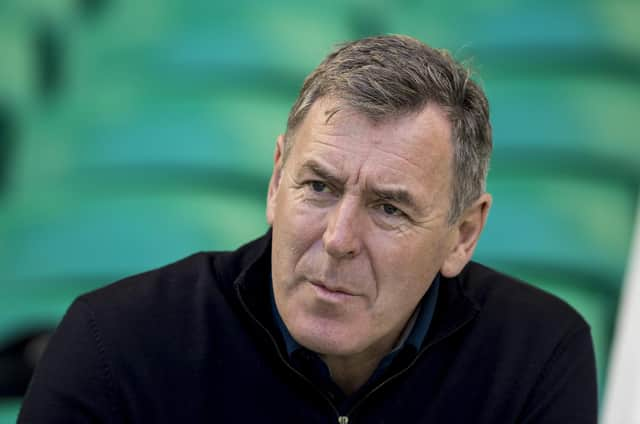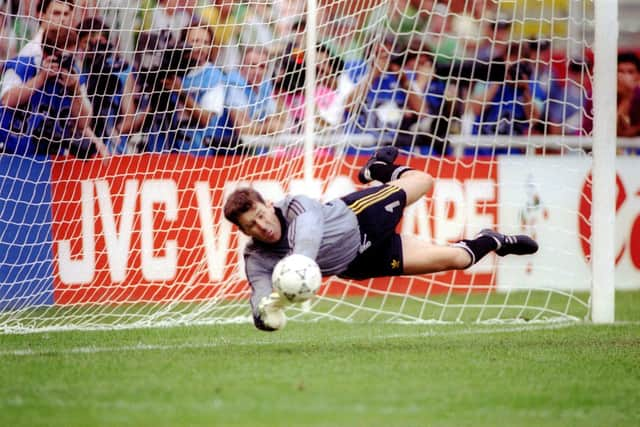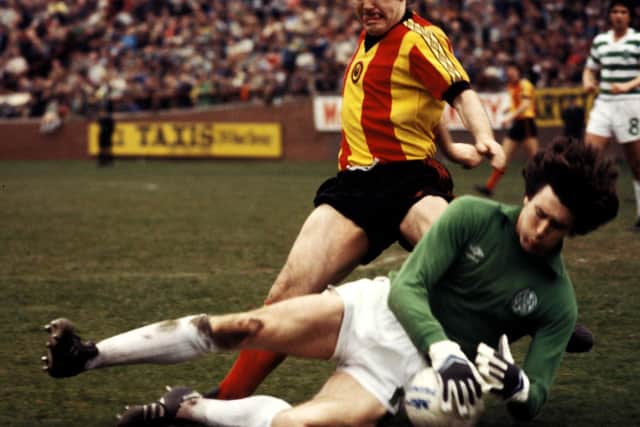Aidan Smith's Saturday Interview: Celtic and Republic of Ireland legend Pat Bonner - 'Beating Scotland at Hampden lit the fire for our golden era'


The dilemma then was which place he called home. Donegal or Glasgow? The former was his heartland. Ah, but the latter was where he became a legend and where he and his wife Ann had raised a family. There was, though, no urgency about the debate and dilemma is overstating things. Really this was a little conversation he liked having with himself, and sometimes his better half.
“For 30-odd years,” he told me over coffee in the Merchant City, “there’s been this joke between Ann and I. It goes back to my Celtic days. I’ll say: ‘Ach, do you know, I’ve got to go home.’ She’ll say: ‘But this is your home.’ She’s right, of course.” A pause, a smile, then: “Actually no. We’re both right.”
Advertisement
Hide AdAdvertisement
Hide AdSo I’m wondering today, now that it’s 40-odd years, is the joke still going strong? “Funny you ask because over the last wee while it’s changed. Where do we see ourselves ending up? Ann, who’s Scottish, doesn’t think that for her it will be Donegal. I’m asking myself: ‘Should it be for me?’ The thing is, we need to be together when that day comes. So, aye, we’re having an interesting debate about where we want to be buried!”


Don’t be alarmed, Packy, 62, isn’t going anywhere just yet. As a kenspeckle voice on BBC Scotland’s Sportsound, he’s just witnessed the revival of Celtic, champions again. And he wants to be around for a similar upturn in the fortunes of the Republic of Ireland, so what better moment for that to begin than this evening.
The 80-cap Bonner will be at the Aviva Stadium for the Nations Cup tie against Scotland. “I desperately wanted you guys to qualify for the World Cup,” he says. Now, though, he desperately wants to beat us.
This time we must chat by phone because he’s already in Ireland, the journey over there taking a bit longer these days. “Since Covid there have been no flights between Glasgow and Donegal. We absolutely must get that route back.”
Here, Bonner might sound a bit like a politician. A few years ago he thought about becoming an MEP. He won 20 nominations to stand for the Fianna Fail party in the seat covering Donegal but ultimately decided against the Brussels gig. “It would have been a big change in my life but I remain deeply interested in politics, in society. I want to see a good society. Scotland I think has one. In my 44 years there I’ve never had any issues. I’m obviously very interested in the Irish story too and if you were in my house in Glasgow you’d hear the radio constantly flicking from Radio Five to Radio Scotland to RTE and – when I can find it – the local Donegal station. Politics or music? It’s politics for me.”


I’m not surprised that, even just for a brief moment, he considered standing for election. A chunk of our conversation last time was devoted to the Celtic Tiger, Bonner’s take on Ireland’s economic miracle of the 1990s and its aftermath. There’s a view that the Emerald Isle’s bountiful confidence during that decade came from the World Cup thrills at its beginning, when a penalty save by Bonner sent the country wild and their football team managed by the buccaneering Jack Charlton into the quarter-finals. Even so, the goalie’s presence on the list of Euro candidates didn’t impress one of his political rivals, an ex-dairy farmers’ leader, who harrumphed: “I think the country has moved on from Italia 90.”
Bonner laughs when I mention this, and at the notion he might have traded on the moment in Genoa when he stuck out a right hand to foil Romania’s Daniel Timofte. “I don’t speak about the penalty, at all, but folk still mention it even 32 years later. This is a generation which is getting older and who experienced a very positive emotion that day so it’s staying with them. They remember where they watched that game, who they were with and what they were doing in life just at that time.”
It was 25 years after the event that Bonner got to speak with Timofte and trade their hero/villain experiences. “We hooked up on a podcast organised by an Irish newspaper. I told him that some pals in Donegal who’d been renovating a little fishing boat – a half-decker, we’d call it – finished the job on the day of the game, were wondering about a name, and then one of them went: ‘We should call it Timofte.’ Daniel told me that after he finished up playing he opened a bar in his home town which he called ‘Penalty’. He suffered a hard time after the miss, and I’m still sorry about that, but he decided that if anyone gave him hassle in his own pub he could have the great pleasure of chucking them out!”
Advertisement
Hide AdAdvertisement
Hide AdSo where did it all begin, this golden age for the men in green? Bonner is in no doubt here – February 18, 1987, Hampden Park. “That was a qualifier for the ’88 Euros. The reverse fixture had been the year before at Lansdowne Road, a grim 0-0 draw that no one remembers so please don’t ask me about it. But could we win in Glasgow against a good Scotland team, maybe not one of the top ones of all time but still with guys like Mo Johnston, Davie Cooper, Alan Hansen, Roy Aitken, Brian McClair and Richard Gough?” Win the Republic did, thanks to a sixth-minute goal from Mark Lawrenson. “That was a huge milestone in the development of our team. It lit the fire and after that we really started to believe.”
Dig out the Irish line-up from these two clashes – combined attendance touching 100,000 – and you wonder why this team was hiding its light under a bushel. Bonner – Jock Stein’s last signing for Celtic, 641 games, five league titles, five Scottish Cups, two League Cups – runs through it for us: “Jim Beglin was one of our full-backs but then he got a bad injury so we had a problem in the position for the Hampden game so Jack moved Paul McGrath from central defence and also brought in Ronnie Whelan.
“Ronnie was a lovely mover, a great passer and read the game brilliantly, while Paul was world-class. And just look at the calibre of club supplying Ireland at that time, your Liverpools, your Manchester United, your Arsenals.
“Directly in front of me were Mick McCarthy and and Kevin Moran, both of them so brave. Kevin wasn’t the tallest and putting his head where it hurts he’d often come away with cuts and need bandaging up. These two weren’t particularly quick, though, and Jack wanted me on sentry-duty, well off my line.” The original sweeper-keeper, then? “Oh I don’t know about that. The boys who do it today at least have perfect playing surfaces for passing the ball with their feet. We won the league once at Parkhead and there wasn’t a single blade of grass to be seen anywhere on the pitch.
“Lawro [Lawrenson] was a centre-back who Jack liked to put in midfield to protect the defence. He was a very modern player and would have excelled in the game now. Liam Brady was our genius. He was reporting back for Ireland duty from Juventus, then Sampdoria, then Inter. He was criticised for not always bringing his club form, but that’s a common issue when so much can be expected from the most glamorous player, sometimes too much.
“Liam was great at linking up with his old Arsenal team-mate Frank Stapleton who I’d describe as a self-made striker. Every day after training he’d stay out to work on his little drills and just about every time – with me as his guinea pig – he’d hit the target. Then there was Ray Houghton who provided us with great energy. He was born in Castlemilk but you guys never capped him! Jack didn’t know Ray’s father hailed from Donegal until he came to Oxford United to watch John Aldridge. Both John and Ray moved quickly to Liverpool after their performances for us.”
If that Hampden win was crucial for Ireland then so was Gary Mackay. The Hearts stalwart scored the goal in Bulgaria which confirmed the Republic’s place at their first-ever finals. “Scotland had nothing to play for that night but thankfully they, and Gary, did us a huge favour. I watched the game at home with my son Andrew, then just a tot, on my lap. When the goal was scored the wee thing went right up in the air.” (The keeper caught him on the way back down).
At the tournament in West Germany Bonner produced an outstanding performance, maybe the career-best, to repel Gary Lineker and John Barnes. Victory over England was followed by a draw with the mighty Soviet Union team of the period – “We could have won” – and defeat through an 82nd-minute goal by eventual tournament winners Holland.
Advertisement
Hide AdAdvertisement
Hide AdRight away, a national debate began over Ireland’s tactics. Could they – with the personnel at their disposal – have achieved more? “That discussion continues today. The purists very much think we should have done.” Charlton was criticised for an agricultural style of play but Bonner won’t hear a bad word against his old boss, who died in 2020.
“I loved the man, loved his company. He held the room, treated us as adults and loved a debate – not just about football but everything. Folk who never met Jack loved him from what they saw on TV and read about him. For Irish folk, although coming from England, he was very close to our culture in many ways.”
Following their first Euros with their first World Cup, the Republic kind of stole Scotland’s clothes. “We in Ireland were very jealous of you guys when you were habitual qualifiers. Growing up I watched Scotland in ’74, Davie Hay and Danny McGrain, and then in Argentina. Our country at the World Cup seemed just a dream. Then in Italy when Scotland moved out of Rapallo that became our base. And when we kept qualifying [America in ’94 and the famous Giants Stadium victory over Italy, Houghton scoring the winner and Motherwell’s Tommy Coyne playing the game of his life] Scotland kind of fell away.”
But Ireland haven’t been back to the finals since the Far East version in 2002 when Packy, part of the coaching staff, witnessed Roy Keane’s walkout in Saipan over what he called poor preparation. “A magnificent player, difficult to get to know and, no question about it, a man of independent mind,” is Bonner’s summation.
Since then for the Irish, just like Scotland, there has been a procession of managers, a foreign experiment, the odd appearance at the Euros but no more World Cups. But the Football Association of Ireland were also left reeling from the ill-starred reign of CEO John Delaney. Before a government bailout the debt had topped 70 million euros.
Among the excesses the FAI were found to be stumping up the rent of Delaney’s home to the tune of 3,000 euros a month while an infamous James Bond-themed birthday party for the man cost 80,000 euros of association funds. “Some of the stuff was incredible,” says Bonner, who’s joined the FAI board as part of a complete overhaul of operations.
“Toughest for us right now is trying to bring through the young players. In Scotland, Celtic, Rangers and some of the other clubs can provide youngsters with European football. Celtic are going into the Champions League and Rangers have just performed magnificently in the Europa League. These experiences will be invaluable but in Ireland where will they come from? Our brightest prospects are no longer getting to go to the likes of Liverpool, Man U and Arsenal and Brexit is a problem here because England clubs and Scottish ones, which used to act as a finishing school for our talent, can’t sign under 18s anymore. That’s a paradigm shift. We’re going to have to develop kids in a different way. A new academy system has been put in place but that’s going to take time to establish itself.”
The future may be uncertain but for Bonner the Scottish-Irish links grow ever stronger. Next month his daughter Melissa marries her Glaswegian fiance. Son Andrew is also married to a Scot. “And my grandson Alan, who’s 14, is football-daft, plays all the time and supports both our countries. It’s so important for his generation that they get to enjoy the experiences we lived through so I’d love for him to see Ireland and Scotland back at the World Cup.”
Comments
Want to join the conversation? Please or to comment on this article.